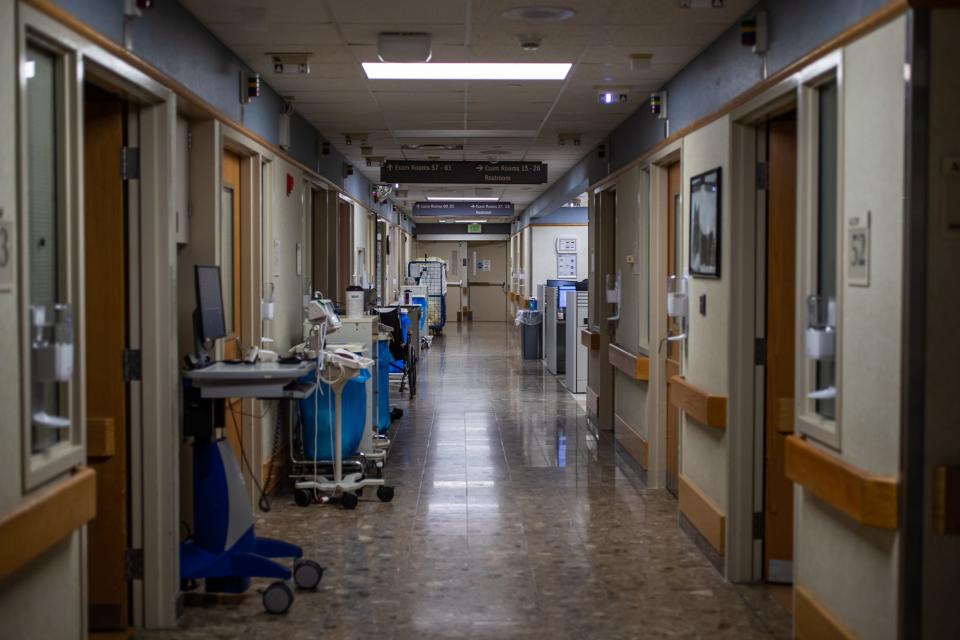Op/ed: Yes, hospital costs in Indiana are too high. Here's why — it's not what you think
There is a well-orchestrated campaign aimed against nonprofit hospitals by the Hoosiers for Affordable Health Care and the Employers’ Forum of Indiana. We believe the bills filed in both the House and Senate at the urging of Hoosiers for Affordable Health Care and the Employer’s Forum, if passed in their original forms, would force nonprofit hospitals to cut services or potentially close, limit access to clinical care, result in a reduction of the workforce and make recruiting and retaining physicians more difficult.
Furthermore, we believe the passage of these bills, in their original forms, will not reduce health care costs to employers or patients but will most likely result in sustained multi-billion-dollar profits for insurance companies. The consequences of these bills, if passed as originally filed, will not attract new businesses to Indiana but will rather deter investment given the anticipated lack of access to care.
At this stage of the legislative process, the bills filed in the House have been the subject of negotiation and have been changed to encourage further dialogue, hopefully resulting in a more collaborative approach among stakeholders. However, the Senate bills remain unchanged as originally filed for the most part. It is uncertain whether the House or Senate bills will prevail in the end.
What others are reading:Massive medical bills? Delayed care? These bills could help.
To avoid the consequences set out above, we respectfully ask our legislators to look into what we believe are the true drivers of the current state of health care costs:
The state of Indiana has not increased Medicaid reimbursement rates in more than 30 years causing a cost shift to commercial insurance (employers) to pay for that shortfall.
Insurance companies reimburse physicians at the fourth lowest rate in the country requiring hospitals to supplement the difference. Without the additional financial support of hospitals, there would be fewer primary care physicians and specialists in Indiana to serve Hoosiers — forcing people to forego treatment or travel out of state for care.
The state of Indiana ranks 45th in public health funding in the country with similar poor rankings for tobacco use, obesity and mental health status, which increases the cost of health care in Indiana compared to other states.
Two-thirds of hospital patients have government-sponsored health insurance that pays hospitals below what it costs to provide services to this population, causing a cost shift to commercial insurance.
The state of Indiana should no longer tax hospitals to meet the state’s Medicaid obligation.
We strongly suggest our legislators address the cost drivers stated above by increasing Medicaid reimbursement to all providers, eliminating the profit the state makes off hospitals through the hospital assessment fee and increasing funding for public health programs for all counties. These components will dramatically improve the health of Hoosiers, attract businesses to the state, and maintain access to health care services.
Hospital costs:Indiana lawmakers try to force hospitals to lower prices
It’s easy for the Hoosiers for Affordable Health Care and the Employers’ Forum of Indiana to raise the red flag, simply shout, “health care costs are too high” and urge passage of legislation that will financially devastate nonprofit hospitals which, in their eyes, will bring costs down. Should that devastation occur, and hospitals be forced to reduce or eliminate services to regain financial stability, it will take years, if even possible, to rebuild what they are urging the legislature to destroy.

These lobbying groups are openly targeting a certain group of not-for-profit hospitals like ours, even though we provide billions in uncompensated care. Year after year, these same groups think of new ways to target hospitals and ignore the other drivers of health care costs, such as exploding drug prices, profiteering traveling nurse agencies, for-profit hospitals and record health insurance company profits.

If affordable health care is the goal, and it should be, then Indiana should collect real data and examine every element affecting Hoosiers. Targeting a small group is not a sustainable plan and will have massive unintended consequences.
Steve Beck is chairman of the Franciscan Alliance Central Indiana Board of Directors. Michael Browning II is vice chairman of the Franciscan Alliance Central Indiana Board of Directors.
This article originally appeared on Indianapolis Star: Bills would cut hospital services in Indiana not just reduce costs

